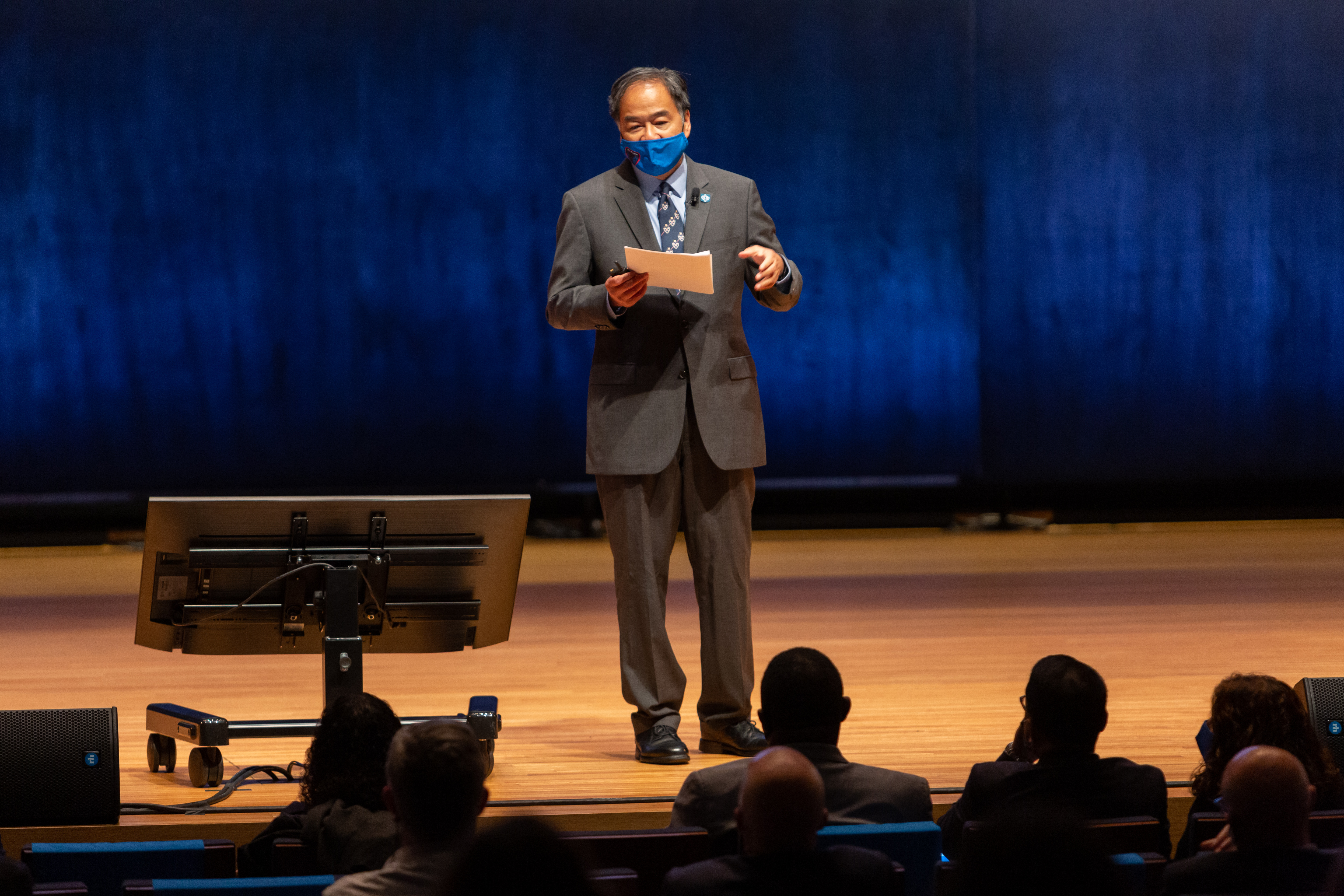 (DePaul University/Randall Spriggs)
(DePaul University/Randall Spriggs)Roughly 100 faculty and staff members joined the 2021 in-person State of the University address yesterday, Sept. 23, to hear from DePaul President A. Gabriel Esteban about university operations and planning for the year ahead. More than 550 watched the address via live stream. Following the presentation, members of the president's cabinet joined the question and answer session.
A recording of this year's address will be shared with faculty and staff in Newsline as soon as it is available. The following summary captures key topics addressed throughout the event.
Preliminary enrollment update
Dr. Esteban welcomed attendees back to campus and thanked them for their unwavering dedication to DePaul's students over the last 18 months.
“We've all been through a lot this last year and a half, and I can't tell you how wonderful it is to see our campus alive again," he said.
Dr. Esteban shared preliminary enrollment and financial updates during the address, emphasizing final enrollment numbers will be available following the census in October. On a national scale, higher education faces continued challenges.
“While DePaul is doing well relative to our sister institutions, we continue to face headwinds," he said. “Costs continue to rise, more students are foregoing college and public perception of the value of a college degree continues to wane."
Dr. Esteban also noted demographics as one of the largest challenges DePaul faces in the coming years.
“Experts expect a 16% decline in Illinois high school graduates, and a 14% decline for the Midwest, by 2026," he said.
This year's overall preliminary enrollment is down 1.2% from last year, driven by the decline in graduate enrollment. However, DePaul is on track to once again break records this year in terms of the size of its freshman class and the diversity of its student population.
For the first time since fall 2012, DePaul potentially has more undergraduate students enrolled than the prior year, with preliminary undergraduate enrollment up 1%.
Financial recap and a glance at FY22
Fiscal year 2021 saw a decline in net tuition revenue, becoming the fourth consecutive year with a net tuition revenue decline.
However, gifts, grants and other revenues increased due to federal funds received to provide relief from the effects of the COVID-19 pandemic and a highly successful fundraising year. Dr. Esteban also noted a decrease in auxiliary revenues and expenses due to changes necessitated by the onset of the COVID-19 pandemic.
Looking ahead to fiscal year 2022, Dr. Esteban anticipates DePaul will see a small increase in net tuition revenue to $444 million and auxiliary revenues to return to pre-pandemic levels of $52 million.
Priorities for the year ahead
The university is now at the midpoint of its strategic plan, Grounded in Mission. Dr. Esteban stated DePaul has made progress on many of the goals within the plan's six areas. Newsline shared a detailed update on midpoint progress prior to the State of the University address.
“Our priorities for the year ahead focus on two main areas: initiatives to support greater student success and academic initiatives to expand access to a DePaul education," he said.
Student success initiatives focus on increasing retention and persistence.
The Academic Continuity and Engagement Initiative, or ACE, is a mission inspired, data driven undergraduate student success initiative that aims to increase retention and graduation rates. ACE tactics for the upcoming year include sophomore year success coaches who will focus on students of color, retention specialists and resources developed for the sophomore experience, specifically targeting new to campus sophomore and transfer students.
Additionally, DePaul's academic initiatives will also be student centric. From offering flexibility with a range of course modalities to adult education, the university plans to adapt to continue meeting the needs of students.
“We assume learners will need educational content throughout the majority of life, which is why we are creating programs that support those needs," Dr. Esteban said. “The goal is to minimize skills gaps and ensure learners are prepared for the future of work through varied learning opportunities."
Dr. Esteban also emphasized the university's commitment to improving employee morale in the wake of COVID-19.
“We understand there is burnout for everyone – faculty, staff and students alike," he said. “This is an issue at other institutions as well. Beyond the Stress Relief Days we provided this summer, we are committed to working with Staff Council to further support staff."
To close, Dr. Esteban thanked attendees again and reminded faculty and staff to take care of themselves and each other.
“I know how much effort you put into making DePaul an excellent living, learning community," he said. “Thank you again for all that you do for the DePaul community."
Rachel Wojnicki is an editor of Newsline and the internal communications manager in University Marketing and Communications.